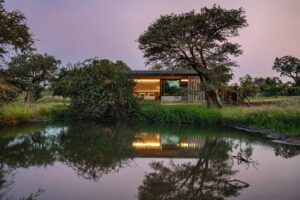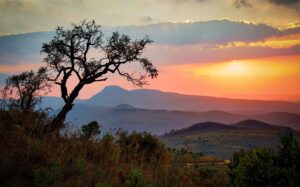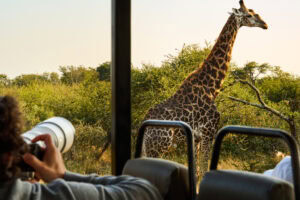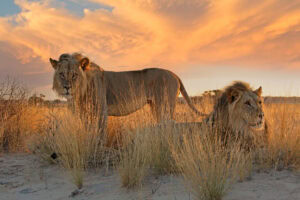South Africa’s safari options are as varied as its landscapes, from the expansive plains of the Kruger National Park to the exclusive, game-rich areas of Sabi Sands and the family-friendly, malaria-free safari reserves. Our carefully curated safari packages are designed to accommodate a range of comfort levels while ensuring that every journey is underpinned by responsible tourism practices that support conservation and local communities. When planning your trip, remember that international flights are a significant part of the overall cost and are not included in the quoted safari prices.
Factors That Impact the Price of a South African Safari
Destination
South Africa’s safari destinations vary in cost due to factors like seasonality, popularity, and accessibility. For instance, safaris in private game reserves like Sabi Sands tend to be more expensive than those in public parks like Kruger. However, these private reserves offer exclusive game viewing, fewer crowds, and often higher service levels.

Accommodation
In South Africa, a safari can range from $800 per person per night during the low season to $2,600 per person per night in luxury lodges during the high season.
Time of Year
South Africa is an all-year destination offering exciting urban escapes in Cape Town between the peak summer season of December and February. Travelling for a safari during South Africa’s dry season (May to October) can generally be more expensive due to optimal wildlife viewing conditions. However, visiting during the green season (November to April) can reduce costs and offer unique birding opportunities and lush landscapes.

Duration
The length of your safari will directly impact your budget. A longer stay allows for a deeper immersion into South Africa’s varied ecosystems but will increase your overall cost. It’s useful to note that some of our preferred partner lodges offer discounts for longer stays during the low season.
Group Size
Choosing to travel with a group of friends or opting for a family safari can make you eligible for group discounts, reducing the per-person cost. Conversely, small groups or solo travellers in South Africa may experience higher per-person rates, with single supplements from 50% to 75% more than a per person rate.

Extra Activities and Excursions
Discover Africa works exclusively with lodges that include the standard game drives in your stay, ensuring a seamless and immersive safari experience without unexpected additional costs. Our expert advisors are able to tailor your safari package according to any additional activities and excursions you may want to experience. Any additional activities, such as fishing excursions or cultural visits, may come at an extra cost.
Park Fees and Permits
Entry fees for South Africa’s national parks and private reserves vary. For example, daily conservation fees for Kruger National Park are around $29 per person, while private reserves may charge higher fees to maintain exclusivity and conservation efforts. Keep in mind that some outfitters add their own conservation and community levies, which will be in addition to the quoted price, depending on the camp. These fees are compulsory and are added directly.

Travel and Transfers
Consider the cost of international flights to South Africa and domestic transfers to safari lodges. Internal flights within South Africa, such as from Cape Town or Johannesburg to Skukuza near Kruger, are often necessary and can range upward of $300 per person.
Meals and Drinks
Many safari lodges in South Africa offer full board options, which include all meals and local drinks. Luxury lodges often provide gourmet meals, fine wines, and other amenities as part of the package. Our travel consultants can help ensure you know what you’re paying for.
Travel Insurance
Comprehensive travel insurance is vital to cover any medical emergencies, trip cancellations, or other unforeseen events. Discover Africa does not sell travel insurance directly but our travel experts can provide guidance if needed. The cost typically ranges from $75 to $200, depending on the level of coverage and length of stay.

Tipping and Gratuities
While not compulsory, tipping in South Africa is voluntary and should depend on the quality of the service. We encourage guests to see this as a way to show appreciation and support for the community. As a general guideline though, we recommend about $20 per person per day for your guide, about $15 for trackers, and about $20 for general staff (porters, cooks, cleaners, waiters, watchmen, etc.).
Most places have a ‘tip box’ for staff (excluding guides), allowing you to leave a collective tip. Tip once at the end of your stay at each lodge or camp.
Visas and Vaccinations
There are currently no vaccinations required to enter South Africa. Additionally, consider any necessary vaccinations for malaria prophylaxis to safeguard your health during your trip. Also, be sure to check for related information depending on your nationality, including whether you have visa-free access.
Personal Expenses
Set aside a budget for souvenirs, personal items, and incidental expenses. This could range from $50 to $300 depending on your preferences and planned activities.
Inclusive Estimates, No Hidden Fees
At Discover Africa, we ensure that our pricing is clear and straightforward, with no hidden fees. Our Safari Cost Estimator provides all-inclusive estimated pricing for South Africa, covering park fees, conservation fees, and all necessary levies. Our expert travel consultants are on hand to help you determine your exact safari budget based on your expected levels of comfort and safari experience. This allows you to plan your safari with confidence, avoiding unexpected expenses.